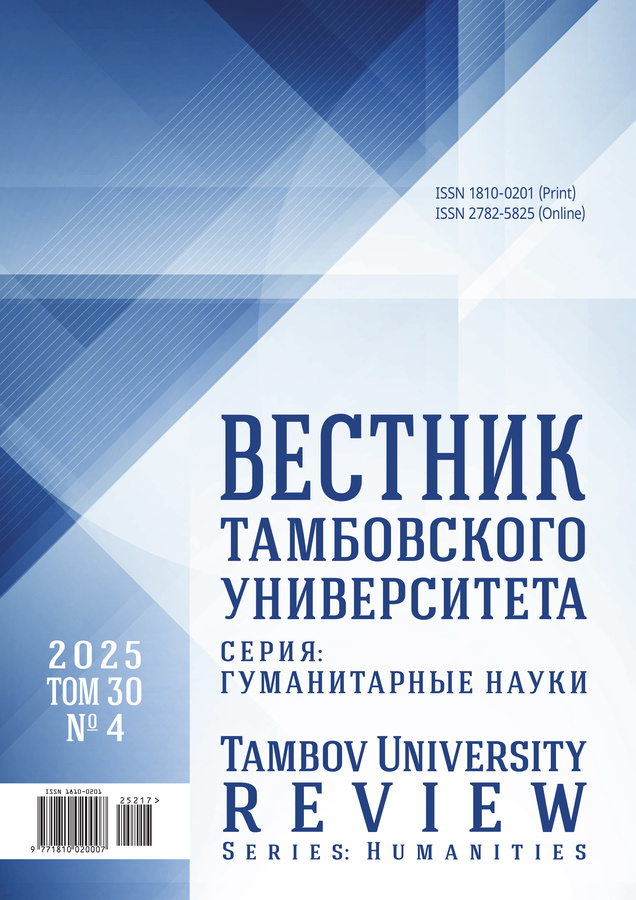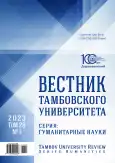Теоретические аспекты проблемы развития учебной мотивации у студентов высшей школы в зарубежных исследованиях
- Авторы: Каитов А.П.1
-
Учреждения:
- ГАОУ ВО «Московский городской педагогический университет»
- Выпуск: Том 28, № 1 (2023)
- Страницы: 24-38
- Раздел: ПЕДАГОГИКА ВЫСШЕЙ ШКОЛЫ
- URL: https://bakhtiniada.ru/1810-0201/article/view/297897
- DOI: https://doi.org/10.20310/1810-0201-2023-28-1-24-38
- ID: 297897
Цитировать
Полный текст
Аннотация
Актуальность темы исследования обусловлена значимостью проблемы развития учебной мотивации у студентов высшей школы для повышения качества и эффективности высшего образования. Анализ и обобщение зарубежного опыта позволит выявить и включить в отечественную образовательную практику развития учебной мотивации студентов высшей школы наиболее успешные, эмпирически доказавшие свою эффективность педагогические решения и разработки.Цель: на основе анализа зарубежных источников по проблеме развития учебной мотивации студентов высшей школы определить и охарактеризовать актуальные теории, применяемые к изучению учебной мотивации студентов, влияющие на ее развитие факторы, методы и стратегии обучения.Результаты исследования: выявлено, что актуальной теоретической основой исследований учебной мотивации студентов высшей школы являются теории: самоэффективности, достижения цели, ожидаемой ценности, атрибуции, самооценки, самодетерминации. Доказано, что основным условием позитивного развития мотивации студентов к учебной и исследовательской деятельности является создание преподавателями вузов мотивирующей образовательной среды, включающей: поощрение ориентации студентов на цели мастерства, развитие компетентности, предоставление автономии, создание зон ближайшего развития и др. Сделан вывод о целесообразности включения в отечественную образовательную практику высшей школы зарубежного опыта обучения студентов позитивным мотивационным стратегиям, ориентированным на развитие мотивационной компетентности.
Об авторах
А. П. Каитов
ГАОУ ВО «Московский городской педагогический университет»
Автор, ответственный за переписку.
Email: kaitovap@mgpu.ru
ORCID iD: 0000-0003-2721-7448
кандидат социологических наук, доцент департамента педагогики института педагогики и психологии образования
129226, Российская Федерация, г. Москва, 2-й Сельскохозяйственный пр., 4, корп. 1Список литературы
- Navea A., Suárez J. Estudio sobre la utilización de estrategias de automotivación en estudiantes universitarios // Psicología Educativa. 2017. Vol. 23. № 2. P. 115-122. https://doi.org/10.1016/j.pse.2016.08.001
- Higgins N., Frankland S., Rathner J. Self-Regulated learning in undergraduate science // International Journal of Innovation in Science and Mathematics Education. 2021. Vol. 29. № 1. P. 58-70. https://doi.org/10.30722/IJISME.29.01.005
- Gumasing M., Castro F. Determining ergonomic appraisal factors affecting the learning motivation and academic performance of students during online classes // Sustainability. 2023. Vol. 15. № 3. P. 1-31. https://doi.org/10.3390/su15031970
- Каитов А.П. Мотивационное обеспечение реализации индивидуальной образовательной траектории бакалавров педагогического образования // Общество: социология, психология, педагогика. 2022. № 3 (95). С. 118-123. https://doi.org/10.24158/spp.2022.3.18, https://elibrary.ru/nyohvo
- Walker R. Motivating science undergraduates: ideas and interventions // International Journal of Innovation in Science and Mathematics Education. 2010. Vol. 18. № 1. Р. 1-13. URL: https://openjournals.library.sydney.edu.au/CAL/article/view/3530
- Bandura A. Self-Efficacy: The Exercise of Control. N. Y.: W.H. Freeman, 1997. 604 p. URL: https://archive.org/details/selfefficacyexer0000band/page/n1/mode/2up
- Ariani D., Susilo Y. Why do it later? Goal orientation, self-efficacy, test anxiety, on procrastination // Journal of Educational, Cultural and Psychological Studies. 2018. Vol. 17. № 17. P. 45-73. https://doi.org/10.7358/ecps-2018-017-wahy
- Salehi M., Kareshki H., Ahanchian M. The role of social-cognitive references in academic situations on students’ research self-efficacy and research motivation: testing a causal model // American Journal of Educational Research. 2013. Vol. 1. № 3. P. 79-85. https://doi.org/10.12691/education-1-3-3
- Livinti R., Gunnesch-Luca G., Iliescu D. Research self-efficacy: a meta-analysis // Educational Psychologist. 2021. Vol. 56. № 1. P. 215-242. https://doi.org/10.1080/00461520.2021.1886103
- Rathner J.A., Byrne G. The use of team-based, guided inquiry learning to overcome educational disadvantages in learning human physiology: a structural equation model // Advances in Physiology Education. 2014. Vol. 38. № 3. P. 221-228. https://doi.org/10.1152/advan.00131.2013
- McBride E., Oswald W.W., Beck L.A., Murray A.V. “I’m just not that great at science”: Science self‐efficacy in arts and communication students // Journal of Research in Science Teaching. 2020. Vol. 57. № 4. P. 597622. https://doi.org/10.1002/tea.21603
- Urdan T., Schoenfelder E. Classroom effects on student motivation: goal structures, social relationships and competence beliefs // Journal of School Psychology. 2006. Vol. 44. Issue 5. P. 331-349. https://doi.org/10.1016/j.jsp.2006.04.003
- Li B., Turner J., Xue J., Liu J. When are performance-approach goals more adaptive for Chinese EFL learners? It depends on their underlying reasons // IRAL: International Review of Applied Linguistics in Language Teaching. 2022. Vol. 5. P. 1-33. https://doi.org/10.1515/iral-2021-0208
- Kaplan A., Maehr M.L. Adolescents’ achievement goals: situating motivation in sociocultural contexts // Adolescence and Education / eds. T. Urdan, F. Pajares. 2002. Vol. 2. P. 125-167. URL: https://eric.ed.gov/?id=ED471685
- Mayumi K., Zheng Y. Becoming a speaker of multiple languages: an investigation into UK university students’ motivation for learning Chinese // Language Learning Journal. 2021. P. 1-20. https://doi.org/10.1080/09571736.2021.1996621
- Hareli S., Weiner B. Social emotions and personality inferences: a scaffold for a new direction in the study of achievement motivation // Educational Psychologist. 2002. Vol. 37. № 3. P. 183-193. https://doi.org/10.1207/S15326985EP3703_4
- Schunk D.H. Learning Theories: An Educational Perspective. Boston: Pearson Education, 2012. 574 p. URL: https://www.researchgate.net/file.PostFileLoader.html?id=53ad2847cf57d75c068b45c5&assetKey=AS%3A273549456019456%401442230680395
- Weiner B. Motivation from an attributional perspective and the social psychology of perceived competence // Handbook of Competence and Motivation / eds. A.J. Elliot, C.S. Dweck. N. Y.: Guilford, 2005. P. 73-84. URL: https://www.academia.edu/17370038/Motivation_from_an_attribution_perspective_and_the_social_psychology_of_perceived_competence
- Wigfield A., Hoa L.W., Lutz Klauda S. The role of achievement values in the regulation of achievement behaviors // Motivation and Self- Regulated Learning. Theory, Research and Applications / eds. D.H. Schunk, B.J. Zimmerman. N. Y.: Lawrence Erlbaum Asssociates, 2008. P. 169-197. https://doi.org/10.4324/9780203831076
- Woolfolk A.E., Winne P.H., Perry N.E. Educational Psychology. Toronto: Pearson Education, 2019. 510 p. URL: https://pdfcoffee.com/download/woolfolk-prefacepdf-pdf-free.html
- Pintrich P. The role of goal orientation in self-regulated learning // Handbook of Selfregulation / eds. M. Boekaerts, P. Pintrich, M. Zeidner. San Diego, CA: Academic, 2000. P. 452-502. https://doi.org/10.1016/B978-012109890-2/50043-3
- Safdari S., Maftoon P. The development of motivation research in educational psychology: the transition from early theories to self-related approaches // Advanced Education. 2017. Vol. 7. P. 95-101. https://doi.org/10.20535/2410-8286.93906
- Covington M.V. Goal theory, motivation, and school achievement: an integrative review // Annual Review of Psychology. 2000. Vol. 51. № 1. P. 171-200. https://doi.org//10.1146/annurev.psych.51.1.171
- Barron K.E., Hulleman C.S. Expectancy value cost model of motivation // International Encyclopedia of the Social & Behavioral Sciences / ed.-in-chief J.D. Wright. Orlando, 2015. Vol. 8. P. 503 -509. https://doi.org/10.1016/B978-0-08-097086-8.26099-6
- Gaspard H., Wigfield A., Jiang Yi., Nagengast B., Trautwein U., Marsh H.W. Dimensional comparisons: how academic track students’ achievements are related to their expectancy and value beliefs across multiple domains // Contemporary Educational Psychology. 2018. Vol. 52. P. 1-14. https://doi.org/10.1016/j.cedpsych.2017.10.003
- Ryan R.M., Deci E.L. Intrinsic and extrinsic motivation from a self-determination theory perspective: definitions, theory, practices, and future directions // Contemporary Educational Psychology. 2020. Vol. 61. P. 1-11. https://doi.org/10.1016/j.cedpsych.2020.101860
- Stirling D. Motivation in education // Learning Development Institute. 2014. Vol. 31. P. 1-24. URL: https://www.learndev.org/dl/Stirling_MotEdu.pdf
- Góes N., Boruchovitch E. Estratégias de aprendizagem: Como promovê-las? Petrópolis, RJ: Vozes, 2020. 126 p. https://doi.org/10.5585/eccos.n57.19890
- Pachón-Basallo M., Fuente J., González-Torres M., Martínez-Vicente J., Peralta-Sánchez F., Vera-Martínez M. Effects of factors of self-regulation vs. factors of external regulation of learning in self-regulated study // Educational Psychology. 2022. Vol. 13. P. 1-17. https://doi.org/10.3389/fpsyg.2022.968733
- Ballouk R., Mansour V., Dalziel B., McDonald J., Hegazi I. Medical students’ self-regulation of learning in a blended learning environment: a systematic scoping review // Medical Education Online. 2022. Vol. 27. № 1. 2029336. https://doi.org/10.1080/10872981.2022.2029336
- Weiner B. Human Motivation: Metaphors, Theories, and Research. Newbury Park, CA: SAGE Publications, 1992. 391 p. URL: https://books.google.com.gi/books?id=Hls5cPZlS4QC&printsec=frontcover#v=onepage&q&f=false
- Pintrich P.R. A conceptual framework for assessing motivation and self-regulated learning in college students // Educational Psychology Review. 2004. Vol. 16. № 4. P. 385-407. https://doi.org/10.1007/s10648?004?0006-x
- Schwinger M., Trautner M., Pütz N., Fabianek S., Lemmer G., Lauermann F., Wirthwein L. Why do students use strategies that hurt their chances of academic success? A meta-analysis of antecedents of academic self-handicapping // Journal of Educational Psychology. 2021. Vol. 114. № 3. P. 576-596. https://doi.org/10.1037/edu0000706
- Valle A., Nu˜nez J., Cabanach R., Rodriguez S., González-Pienda J., Rosario P. Metas académicas y Estrategias motivacionales de Autoprotección // Electronic Journal of Research in Educational Psychology. 2007. Vol. 13. Р. 617-632. https://doi.org/10.25115/ejrep.v5i13.1251
- Ramırez-Maestre C., Esteve R., Serrano-Ibañez E., Lopez-Martınez A., Ruiz-Parraga G., Rivas-Moya T. Psychometric characteristics and factorial structures of the Defensive Pessimism Questionnaire – Spanish Version (DPQ-SV) // PLoS ONE. 2020. Vol. 5. № 4. P. 1-14. https://doi.org/10.1371/journal.pone.0229695
- Ferradás M., Freire C. Estrategias de self-handicapping y pesimismo defensivo: análisis de su prevalencia en entornos universitarios y diferencias de género // EDUCA International Journal. 2022. Vol. 2. № 1. P. 3045. URL: https://dialnet.unirioja.es/servlet/articulo?codigo=8206722
- Sebesta A., Speth B. How should I study for the exam? Self-regulated learning strategies and achievement in introductory biology // CBE: Life Sciences Education. 2017. Vol. 16. № 2. P. 1-13. https://doi.org/10.1187/cbe.16-09-0269
- Khikmah L. Teachers’ creativity in designing learning activities: sustaining students’ motivation // Journal of English Education. 2019. Vol. 7. № 2. P. 85-92. https://doi.org/10.25134/erjee.v7i2.1639
- Edwards A. Playing to their strengths: empowering students with flexible assessment // International Journal of Innovation in Science and Mathematics Education. 2020. Vol. 12. P. 16-27. https://doi.org/10.30722/IJISME.28.04.002
- Brophy J. Motivating Students to Learn. Boston: McGraw-Hill, 1998. 227 p. https://doi.org/10.4324/9780203858318
- Mahalakshmi K., Radha R. COVID 19: A massive exposure towards web based learning // Journal of Xidian University. 2020. Vol. 14. № 4. P. 2405-2411. https://doi.org/10.37896/jxu14.4/266
- Marek M., Chew C., Wu V. Teacher experiences in converting classes to distance learning in the COVID-19 pandemic // International Journal of Distance Education Technologies. 2021. Vol. 19. № 1. P. 40-60. https://doi.org/10.4018/IJDET.20210101.oa3
- Ismailov M. Designing motivating online assignments and telecollaborative tasks in the time of a pandemic: evidence from a post-course survey study in Japan // Proceedings of Society for Information Technology & Teacher Education Interntional Conference / eds. E. Langran, L. Archambault. US, 2021. P. 600-609. https://doi.org/10.6084/m9.figshare.14390888
- Bouchkioua Z., Mokhlesse L. Motivation to learning: toward achievement // Psychology. 2021. Vol. 12. P. 462-476. https://doi.org/10.4236/psych.2021.123029
Дополнительные файлы










